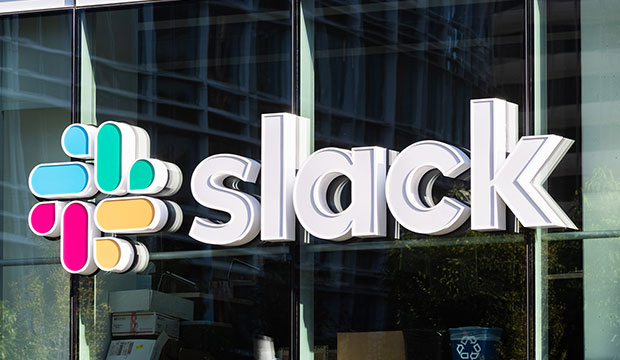CRM giant Salesforce on Tuesday signed a definitive agreement to purchase enterprise communications platform Slack, as widely expected.
Under the terms of the agreement, Salesforce will pay $26.79 in cash and 0.0776 shares of its common stock for each share of Slack, for a total of about $27.7 billion.
“Combining Slack with Salesforce Customer 360 will be transformative for customers and the industry,” Salesforce stated.
“Stewart and his team have built one of the most beloved platforms in enterprise software history, with an incredible ecosystem around it,” said Marc Benioff, Chair and CEO, Salesforce.
“This is a match made in heaven,” Benioff continued. “Together, Salesforce and Slack will shape the future of enterprise software and transform the way everyone works in the all-digital, work-from-anywhere world. I’m thrilled to welcome Slack to the Salesforce Ohana once the transaction closes.”
Slack CEO and Co-Founder Stewart Butterfield enthused, “As software plays a more and more critical role in the performance of every organization, we share a vision of reduced complexity, increased power and flexibility, and ultimately a greater degree of alignment and organizational agility. Personally, I believe this is the most strategic combination in the history of software, and I can’t wait to get going.”
In June, Slack launched Slack Connect, which lets up to 20 organizations share a single Slack channel. This offers “instant communications between businesses,” which can just drop a link to partners, customers, and others in a shared channel instead of going through email or in-person meetings, Butterfield said at the time.
Slack Connect has been widely accepted in the enterprise.
360-Degree View
Slack will be deeply integrated into every Salesforce Cloud and will be the new interface for Salesforce Customer 360, a platform that lets users build unified profiles of their customers, surface customer information, and integrate customer data.
That unified profile, known as a 360-degree view, is the holy grail for companies that seek to capture all data about transactions with customers in order to understand them better and improve sales.
The 360-degree view “makes an organization’s relationship with customers experiential rather than transactional,” according to the Digital Marketing Institute. This is “the key to long-standing customer relationships and positive endorsements.”
Salesforce’s Growing Portfolio
“In acquiring Slack, Salesforce takes another big step toward building its importance to enterprise operations beyond those that are directly customer facing,” Nicole France, a principal analyst and VP at Constellation Research, told the E-Commerce Times.
“It follows in the path already set by the MuleSoft and Tableau acquisitions, which extended Salesforce’s reach into IT and finance/planning, respectively.”
The move gives Salesforce “a healthy and growing revenue stream that will help achieve its stated ambition to reach $40 billion in revenue by 2028 and $60 billion by 2034,” France said.
Salesforce in March 2018 purchased MuleSoft, a platform for building application networks connecting enterprise apps, data and services, across any cloud and on-premise. That deal was a combination of cash and stock totaling about $6.5 billion.
It bought analytics platform Tableau in June 2019 to “accelerate Salesforce’s opportunity in the $1.8 trillion digital transformation space.”
The Slack acquisition “suggests that Salesforce is very likely to expand its portfolio of offerings to compete more broadly with the likes of Oracle and SAP, as well as Microsoft, across business operations capabilities,” France suggested.
Questions About the Deal
Shares of Salesforce stock fell by $4.45 to $241.35 in after-hours trading Tuesday following the announcement of the Slack purchase.
There has been some speculation that this shows the market’s concern about the deal, as many analysts have questioned how Salesforce could afford to pay for the purchase.
Some also feared the purchase was a bad move because Slack has yet to turn a profit and is being soundly beaten by Microsoft’s Teams collaboration platform, which had more than 115 million daily active users (DAU) in October. Slack had not provided a DAU figure since October 2019, when its tally stood at 12 million.
Although Slack “was overmatched competing with Microsoft,” its acquisition by Salesforce “provides the potential for a more even fight going forward, assuming the merger is successful,” Rob Enderle, principal at the Enderle Group, told the E-Commerce Times.
Slack’s open platform seamlessly integrates with more than 2,400 apps, and Salesforce has the largest enterprise app ecosystem, Salesforce said. “Together, Salesforce and Slack will create the most extensive open ecosystem of apps and workflows for business and empower millions of developers to build the next generation of apps, with clicks, not code.”
Salesforce is “still overmatched” by Microsoft but “is large enough to compete more effectively if it focuses on Slack,” Enderle said. However, the two “don’t dovetail nicely, making a favorable outcome less likely.” Further, collaboration within a company’s sales force “isn’t as common as that between operational units.”
Rapid Results
That said, Salesforce “has shown with Tableau and MuleSoft that it’s better at rapidly integrating and delivering value from large acquisitions than most other software vendors,” Rebecca Wettemann, principal at Valoir, told the E-Commerce Times.
“We’ll likely see the impact of the acquisition on the value and roadmap of both Salesforce and Slack in quarters, not years,” she predicted.
Slack “still falls short of Teams on the video and call front, but there are plenty of smaller players Salesforce could tuck in to fill those gaps,” Wettemann noted.
Salesforce may have another option: Slack and video communications firm Zoom signed a contract aligning product roadmaps in 2019, and Zoom offers an app for Slack. Salesforce might be able to work the collaboration between the two to its advantage.























































